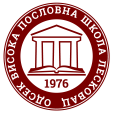On May 19th 2016, Higher Business School of Professional Studies was a host to a workshop “Rural tourism – a chance you shouldn’t miss.” This has been yet another of the numerous activities in the Tempus project „Modernization and harmonization of tourism study programmes in Serbia“.
The following lectures formed part of the above mentioned workshop:
- „Tourism in the function of development of rural areas in Serbia
 “ – lecturer Drago Cvijović, the Dean of Faculty of Hotel Management and Tourism in Vrnjačka Banja
“ – lecturer Drago Cvijović, the Dean of Faculty of Hotel Management and Tourism in Vrnjačka Banja - „The role of ethno heritage and gastronomy in rural tourism of Vojvodina
 “ – lecturer Dragica Samardžić, secretary of Association of tourism and hospitality, Chamber of Commerce Vojvodina
“ – lecturer Dragica Samardžić, secretary of Association of tourism and hospitality, Chamber of Commerce Vojvodina - „Rural tourism and gastronomy – the marvels of Western Serbia
 “ – lecturer Miroslav Rađen, director of Tourist Organization of Western Serbia
“ – lecturer Miroslav Rađen, director of Tourist Organization of Western Serbia - „Preparing rural households for categorization, tourist visit and stay
 “ – lecturer Radomir Stojanović, PhD, HBTS Užice
“ – lecturer Radomir Stojanović, PhD, HBTS Užice - „The funds and ways to finance the development of rural tourism
 “ – lecturer Aleksandar Ostojić, Regional Chamber of Commerce Leskovac
“ – lecturer Aleksandar Ostojić, Regional Chamber of Commerce Leskovac - „Seeking opportunities and making way for small agricultural households
 “ – lecturer Željko Sredić, household “Gostoljublje” Kosjerić
“ – lecturer Željko Sredić, household “Gostoljublje” Kosjerić - An example of good practice „Rural household – Ethno house Sečanica
 “, lecturer Maja Cvetanović
“, lecturer Maja Cvetanović - „Building a network of bike trails and footpaths on Radan mountain
 “ – lecturer Jelena Pavlović, Center for Development of Jablanica and Pčinja district
“ – lecturer Jelena Pavlović, Center for Development of Jablanica and Pčinja district - „Gastronomic offer in rural tourism
 “– lecturer Momčilo Conić, HBS Leskovac.
“– lecturer Momčilo Conić, HBS Leskovac.
Besides the main project partners, workshop attendees were representatives of tourism business entities, representatives of several tourist organizations (Southern, Eastern, Central and Western Serbia) as well as representatives of the Chamber of Commerce of Vojvodina. They had the opportunity to exchange their ideas, thoughts and experience in tourism especially those relating to rural tourism thus coming to a conclusion that tourism can be a trigger to development of rural areas.
Towards the end of the workshop a discussion on the topic of the workshop was opened so that participants could ask questions about the presented examples of good practice. All participants of the workshop were awarded certificates confirming that they have attended and successfully passed the training “Rural tourism – a chance you shouldn’t miss.”




























